Our verdict
Pros
- Functions well as a casual sneaker
- Comfortable for all-day wear
- Suitable for wide feet
- Budget-friendly at only $75
- Appealing aesthetic
- Eco-friendly
- Stable for heel strikers
Cons
- Only for casual runs
- Offers limited arch support
- Insufficient forefoot cushioning
Audience verdict
Comparison
The most similar running shoes compared
+ + Add a shoe | |||||
|---|---|---|---|---|---|
| Audience score | 84 Good! | 85 Good! | 82 Good! | 81 Good! | |
| Price | £70 | £50 | £80 | £90 | |
| Pace | Daily running | Daily running | Daily running | Daily running | |
| Shock absorption | - | Moderate | Low | - | |
| Energy return | - | Low | Low | - | |
| Traction | - | Low | Low | - | |
| Arch support | Neutral | Neutral | Neutral | Neutral | |
| Weight lab Weight brand | 11.2 oz / 318g 10.1 oz / 285g | 9.7 oz / 275g 10.7 oz / 303g | 11.5 oz / 326g 12.1 oz / 343g | 9.7 oz / 274g 10 oz / 283g | |
| Drop lab Drop brand | 12.9 mm 8.0 mm | 9.4 mm 10.0 mm | 11.3 mm 9.0 mm | 12.5 mm 9.0 mm | |
| Strike pattern | Heel | HeelMid/forefoot | Heel | Heel | |
| Size | True to size | True to size | True to size | True to size | |
| Midsole softness | Balanced | Balanced | Balanced | Balanced | |
| Difference in midsole softness in cold | Normal | Small | Normal | Small | |
| Toebox durability | Bad | Bad | Decent | Good | |
| Heel padding durability | Bad | Bad | Decent | Good | |
| Outsole durability | Decent | Decent | Decent | Bad | |
| Breathability | Moderate | Moderate | Breathable | Breathable | |
| Width / fit | Medium | Wide | Medium | Medium | |
| Toebox width | Medium | Medium | Medium | Medium | |
| Stiffness | Moderate | Moderate | Moderate | Stiff | |
| Torsional rigidity | Moderate | Flexible | Moderate | Moderate | |
| Heel counter stiffness | Flexible | Moderate | Flexible | Moderate | |
| Heel lab Heel brand | 31.9 mm 34.0 mm | 31.2 mm 33.0 mm | 30.3 mm 25.0 mm | 30.7 mm 25.0 mm | |
| Forefoot lab Forefoot brand | 19.0 mm 26.0 mm | 21.8 mm 23.0 mm | 19.0 mm 16.0 mm | 18.2 mm 16.0 mm | |
| Widths available | NormalWide | NormalWide | NormalWide | Normal | |
| Orthotic friendly | ✓ | ✓ | ✓ | ✓ | |
| Season | All seasons | All seasons | SummerAll seasons | SummerAll seasons | |
| Removable insole | ✓ | ✓ | ✓ | ✓ | |
| Ranking | #242 Bottom 36% | #202 Bottom 47% | #290 Bottom 24% | #299 Bottom 21% | |
| Popularity | #325 Bottom 15% | #113 Top 30% | #190 Top 50% | #318 Bottom 16% |
Who should buy
We recommend the Adidas Racer TR21 for:
- Heel strikers looking for a budget-friendly roomy shoe that aren't concerned about its heavier weight.
- Individuals seeking a comfortable shoe for daily commuting, strolling around town, or walking the dog around the neighbourhood, in addition to one or two slow runs a week.
- Runners specifically seeking environmentally-friendly running shoes.
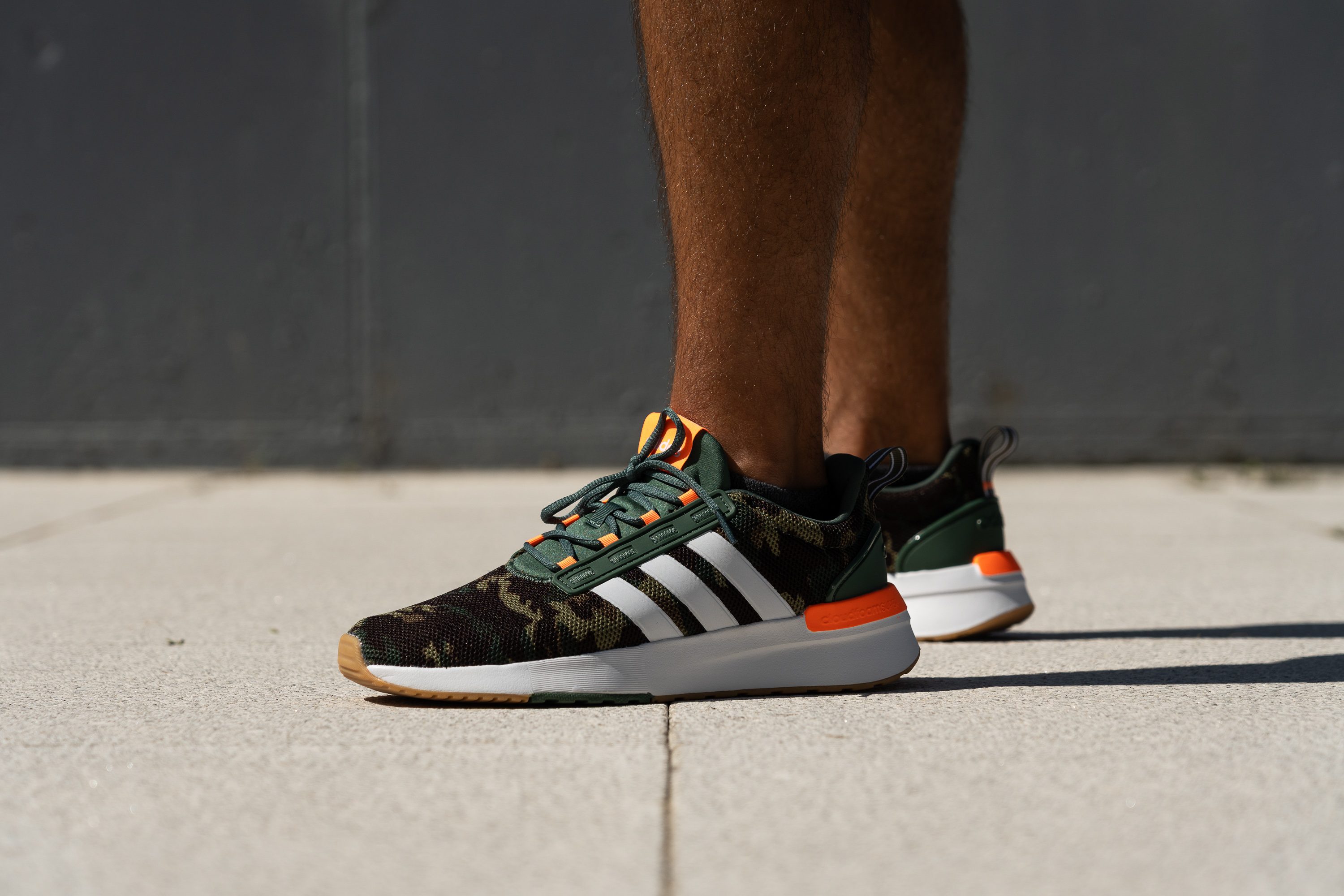
Who should NOT buy
If you're a forefoot or midfoot striker, you might want to look elsewhere—this shoe doesn't offer enough cushioning in those areas as it's designed for heel strikers. If you're in the market for an affordable running shoe suitable for those footstrikes, we recommend checking out the Saucony Axon 2.
Also, for serious runners looking to log heavy mileage or intense training, be aware: the Racer TR21 won't meet your needs.
It's clunky and lacks responsiveness, making it far from the ideal training partner. And despite its potentially misleading name, don't consider it if you're in the market for a dedicated racing shoe. For that purpose, we feel that the Adidas Adizero Adios Pro 3 is a better pick.

Cushioning
Heel stack
With its heel measuring 31.9 mm, the shoe packs enough Cloudfoam Super in this area to accommodate heel strikers.
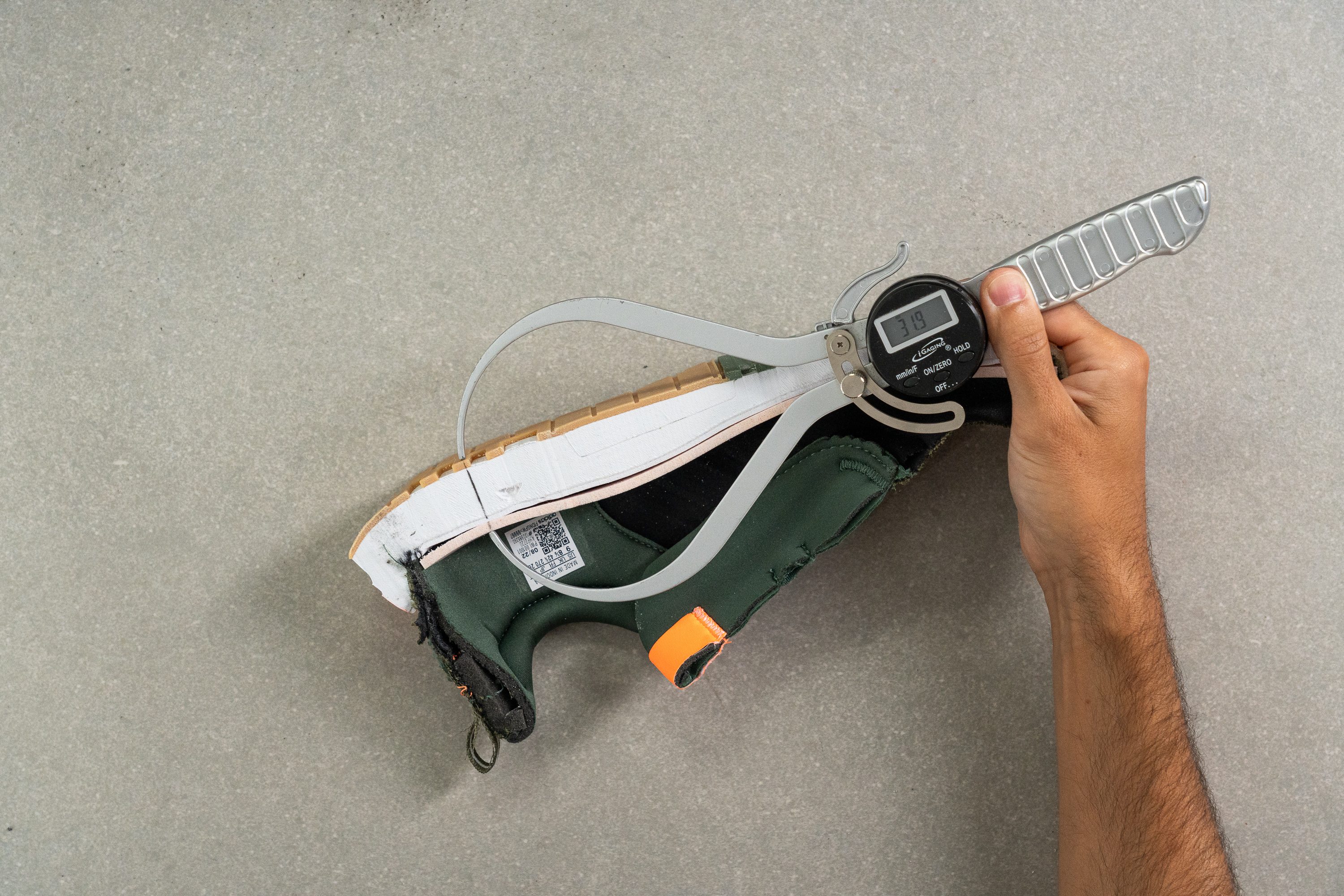
| Racer TR21 | 31.9 mm |
| Average | 34.8 mm |
Forefoot stack
The forefoot, however, falls really short. We measured it below 19 mm, which is extremely low by today's standards, and makes this running shoe a bad choice for any forefoot striker.
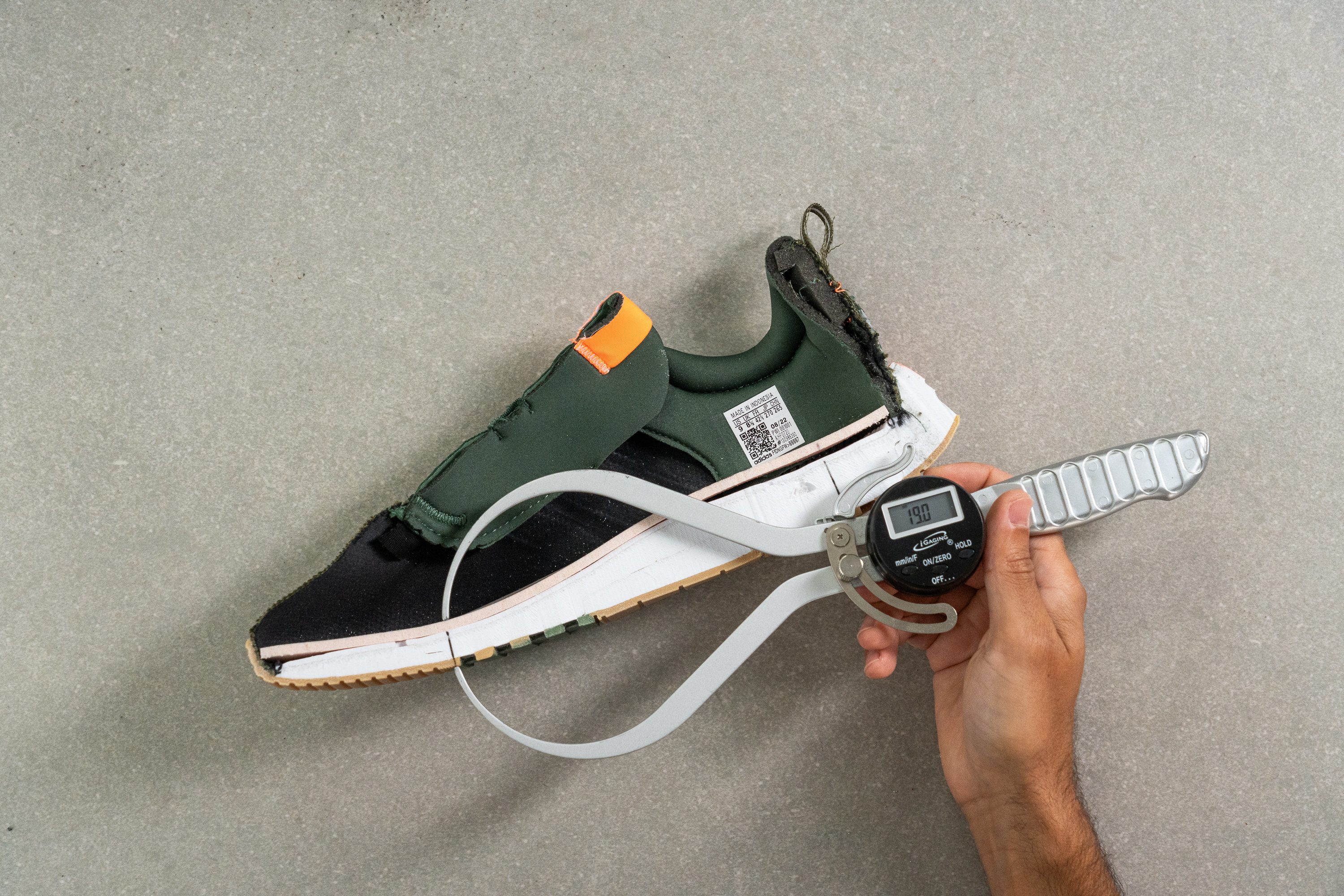
| Racer TR21 | 19.0 mm |
| Average | 26.2 mm |
Drop
Adidas' official specifications give the shoe at a 34/26 mm stack for an 8-mm heel-to-toe drop. Yet, it's not uncommon for us to find discrepancies between the brand's stated measurements and our own.
With the Racer TR21, our meticulous measurements in the lab returned a 31.9/19 mm stack for a 12.9-mm heel-to-toe drop. That's almost a 5-mm difference from the numbers from Adidas. WOW.
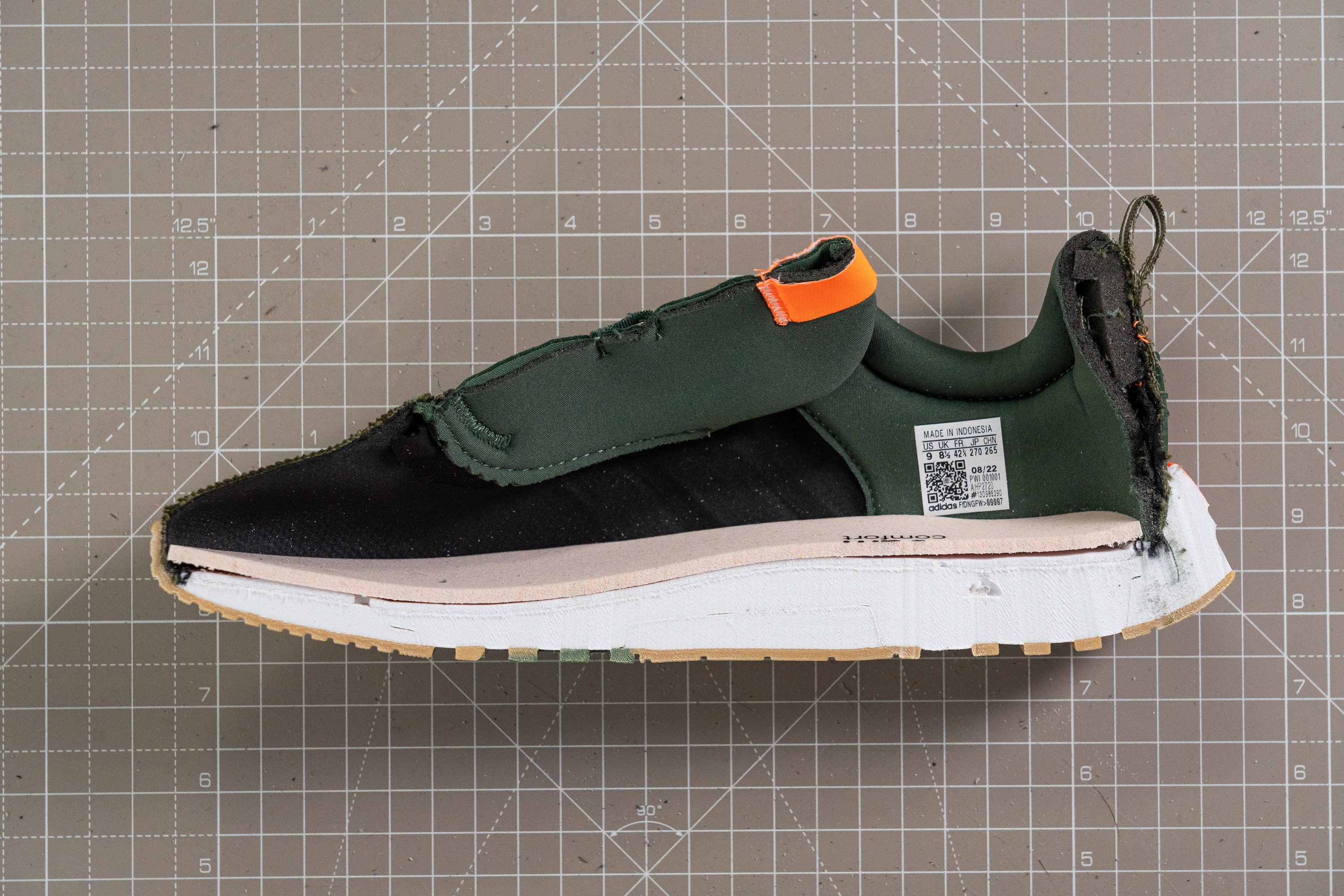
| Racer TR21 | 12.9 mm |
| Average | 8.6 mm |
Midsole softness
With a midsole softness measurement of 21.0 HA, the Racer TR21 delivers a well-balanced experience.
It's not excessively soft or squishy, and it's not too firm either.
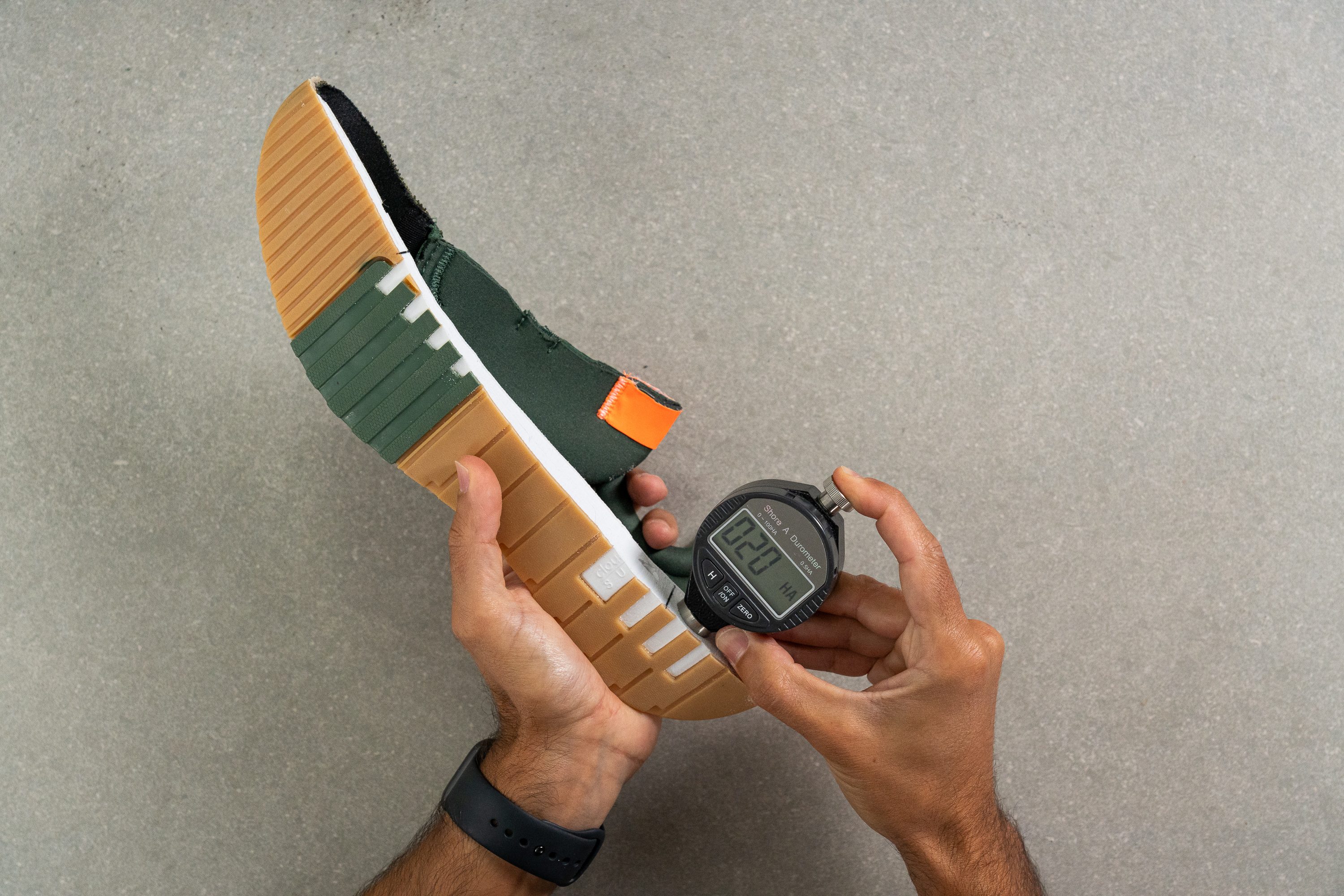
| Racer TR21 | 21.0 HA |
| Average | 20.4 HA |
Size and fit
Size
Adidas Racer TR21 fits true to size (16 votes).
Internal length
At 272.9 mm, the shoe it's a little bit longer than it should (270 mm), but likely not enough to warrant sizing down unless your feet are particularly narrow.
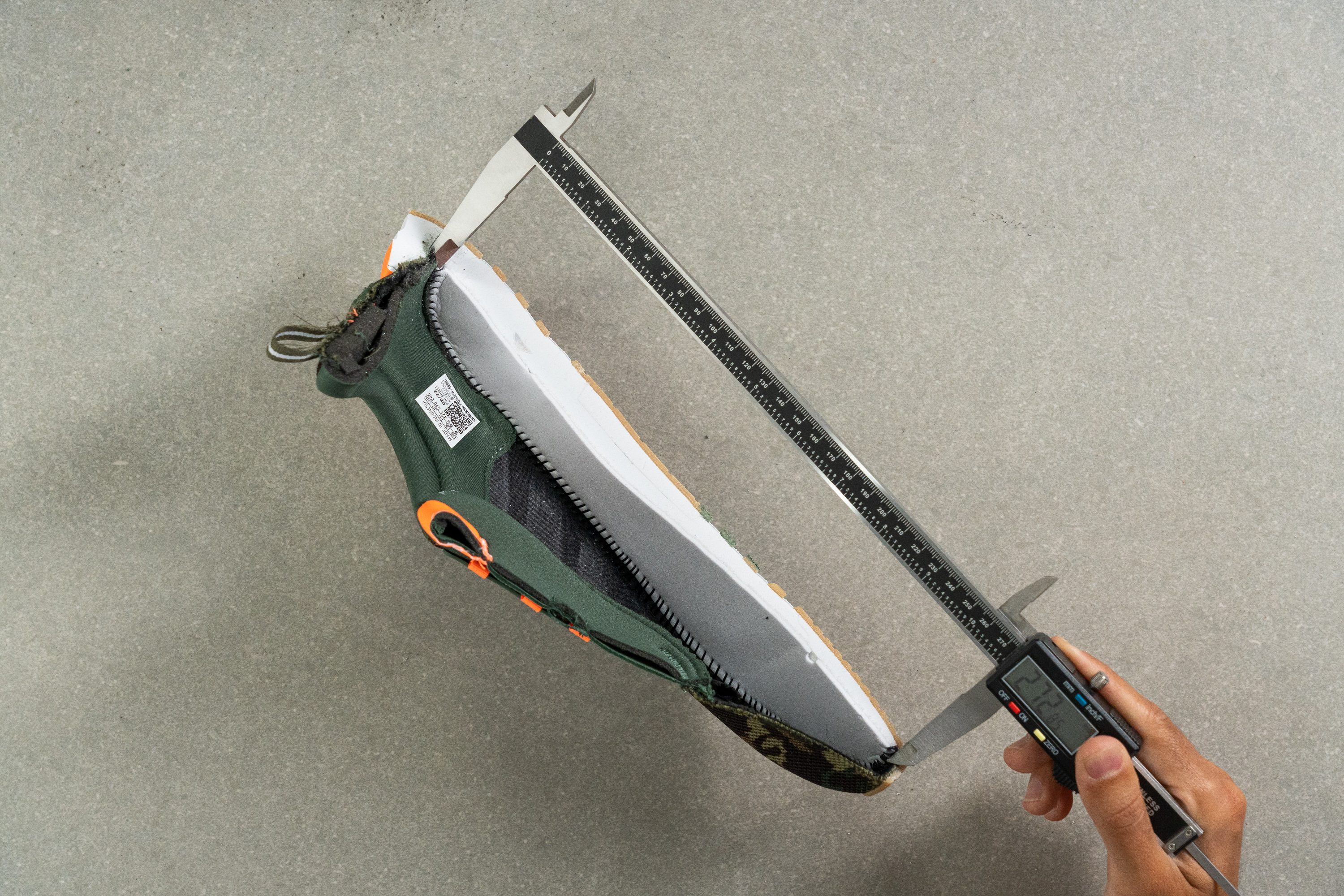
| Racer TR21 | 272.9 mm |
| Average | 269.4 mm |
Width / Fit
With a measurement of 100.4 mm, the Racer TR21 crosses the 100 mm threshold. This makes it, without a doubt, a wide shoe in the shelves.
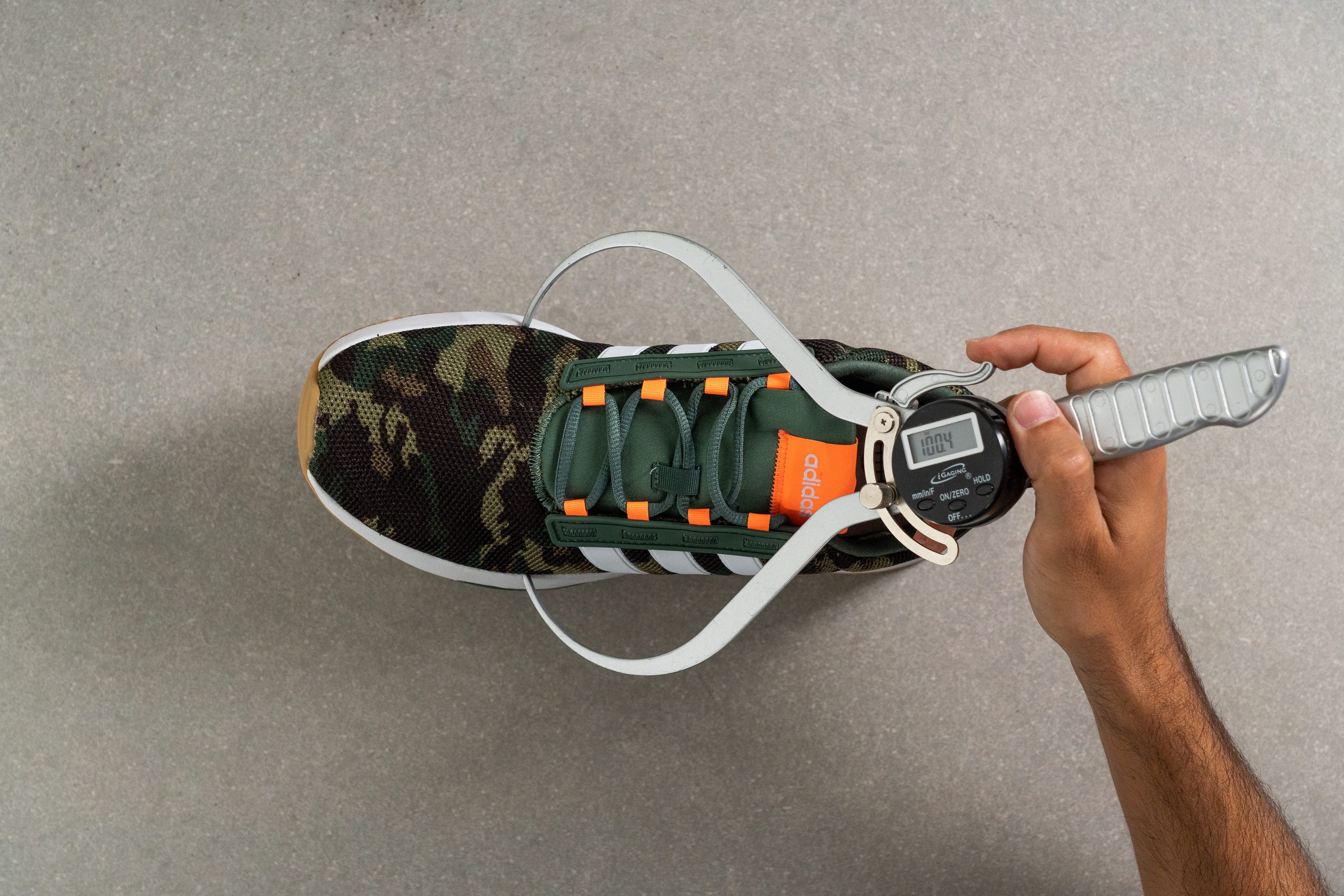
This test follows an older methodology, which is why you don't see recently tested shoes in the chart. Results from different methodologies can not be compared.
| Racer TR21 | 100.4 mm |
| Average | 98.5 mm |
Toebox width
The area for the big toe follows suit, proving even wider in comparison to the rest of the shoe.
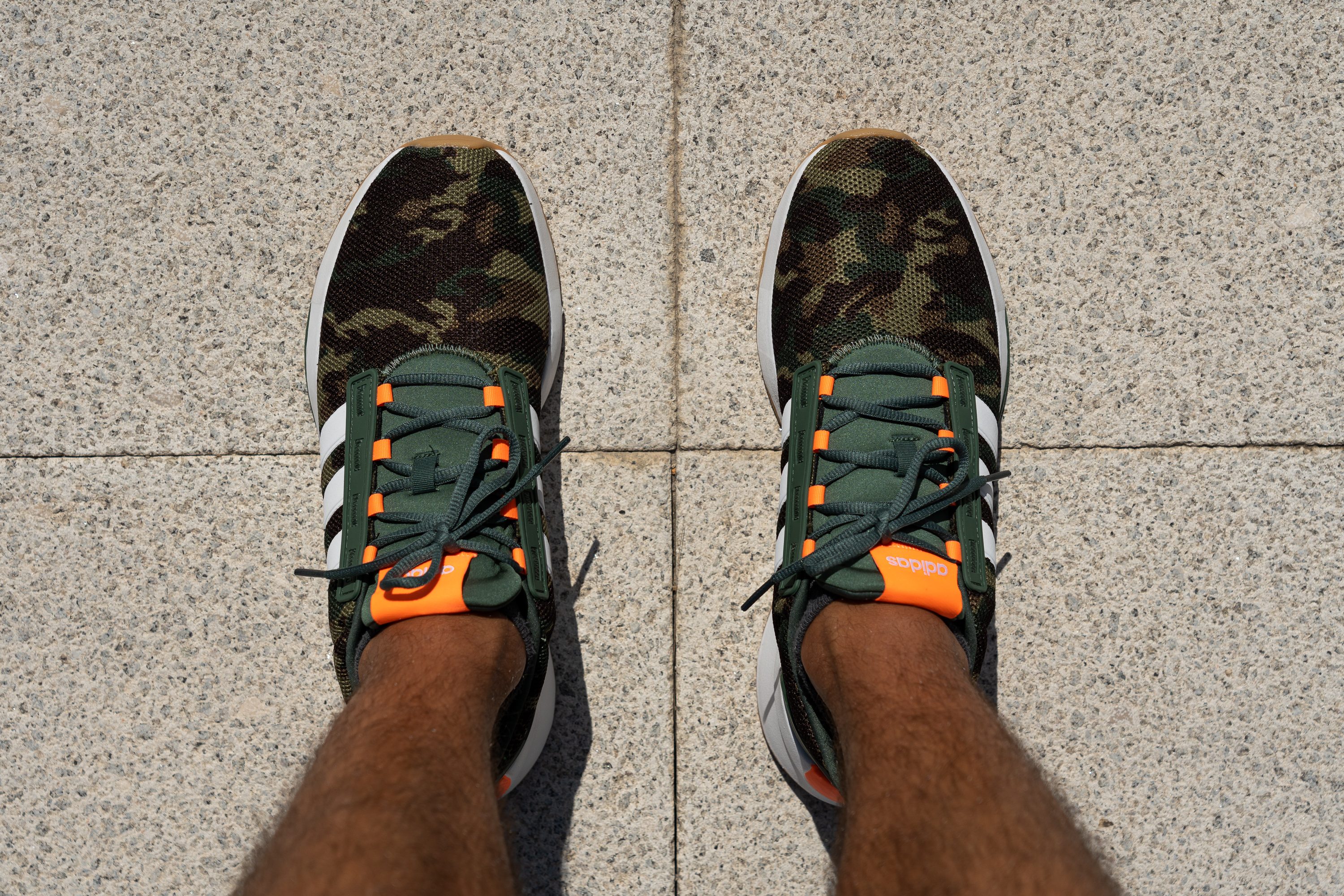
For those of us with wide feet, this shoe really fits the bill.
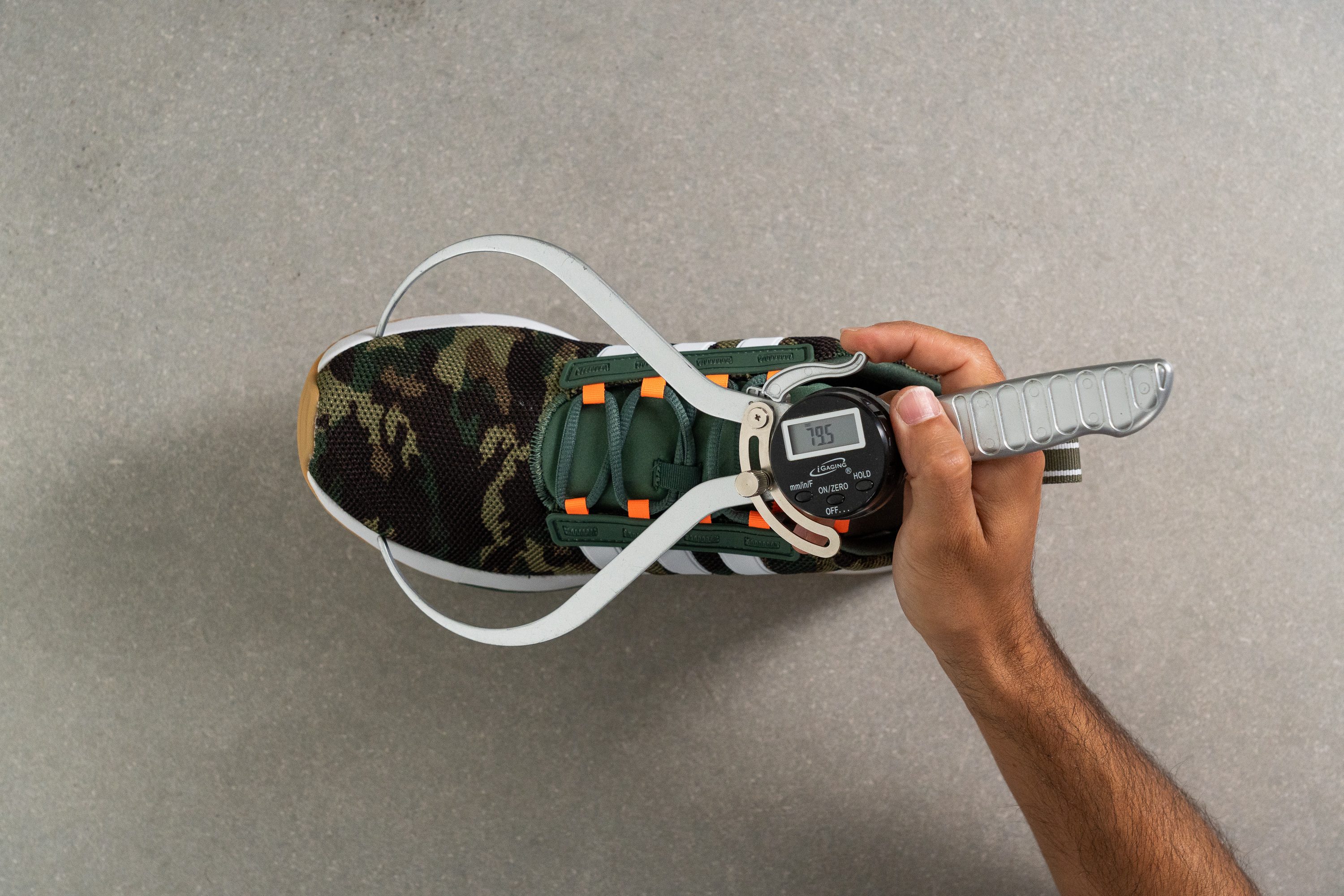
This test follows an older methodology, which is why you don't see recently tested shoes in the chart. Results from different methodologies can not be compared.
| Racer TR21 | 79.5 mm |
| Average | 78.4 mm |
Flexibility / Stiffness
We mentioned earlier that the shoe seemed flexible at first glance, but it didn't show that much when we tried to twist it. It's during the 90-degree bending test that the shoe truly astonished us with its flexibility.
We only made 13.7N of force to bend it to 90 degrees, so it ranks among the top 3% of the most flexible shoes we've ever analysed in the lab.
This test follows an older methodology, which is why you don't see recently tested shoes in the chart. Results from different methodologies can not be compared.
| Racer TR21 | 13.7N |
| Average | 28.1N |
Stiffness in cold (%)
Under cold temperatures, the flexibility follows a similar pattern to the softness. The change is clearly noticeable.
Needing 21.9N of force to bend it to 90 degrees, it doesn't retain its super-flexible characteristic anymore.
This results in a 59.5% increase, which disappointingly underperforms compared to most other shoes.
| Racer TR21 | 60% |
| Average | 33% |
Weight
Who enjoys running around with brick-like shoes? We assume the answer is, not many!
That's why the TR21 weight of 11.20 oz (318g) doesn't seem all that appealing.
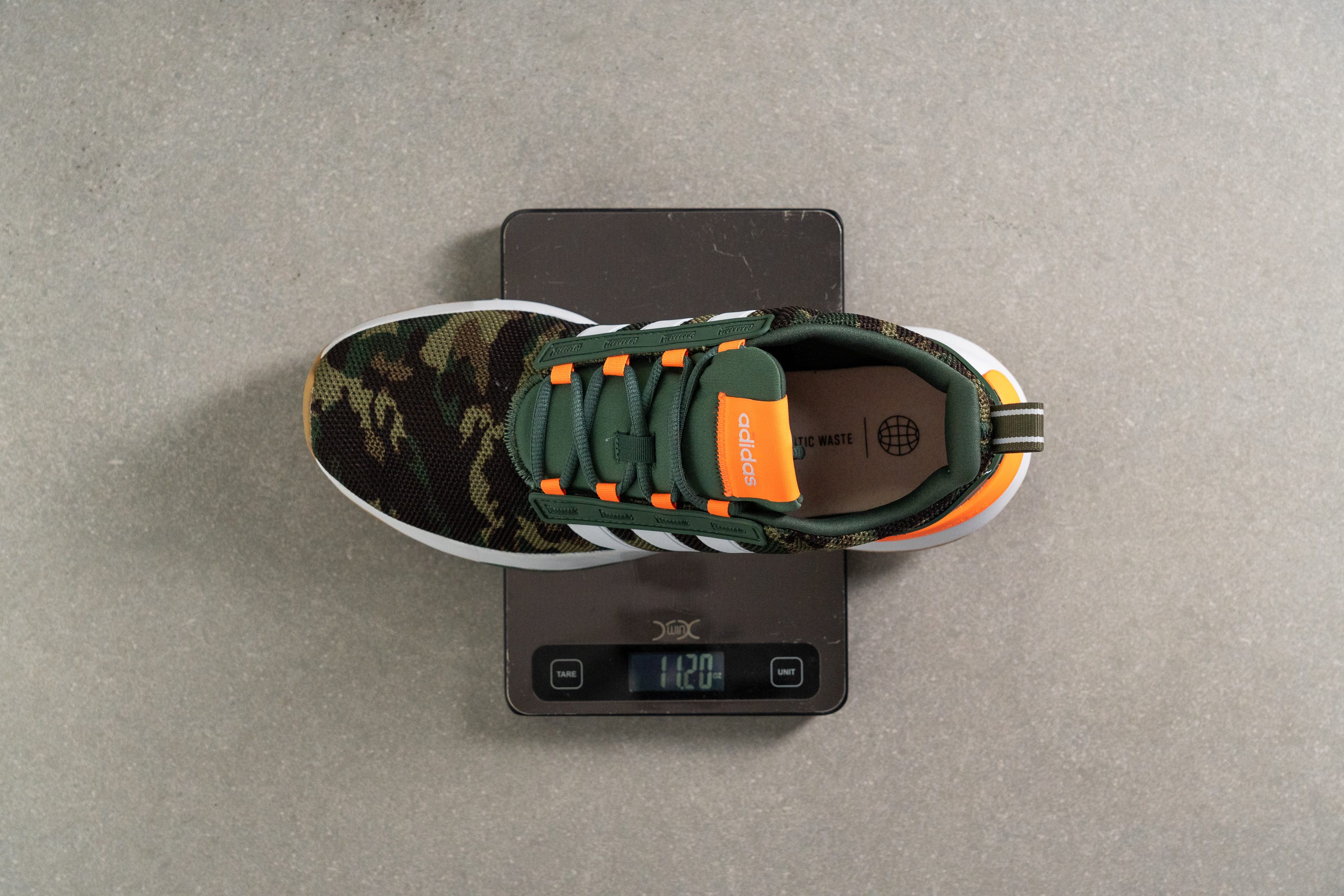
| Racer TR21 | 11.2 oz (318g) |
| Average | 9.3 oz (264g) |
Breathability
While the TR21 isn't strictly a running shoe and you might expect breathability to be somewhat compromised, we found its performance to be okay. It doesn't measure up to top-tier shoes like the Saucony Triumph 20 in this aspect—the video speaks for itself—yet it's good enough to earn a standard 3/5.
The smoke-pumping test results were particularly surprising. When we held the upper to the light, it didn't appear breathable at all, seeming more akin to a 1/5 or 2/5 running shoe.
Our microscope examination provided the same impression. Besides capturing some stunning close-up images, it confirmed the TR21's knit upper as thicker than average.
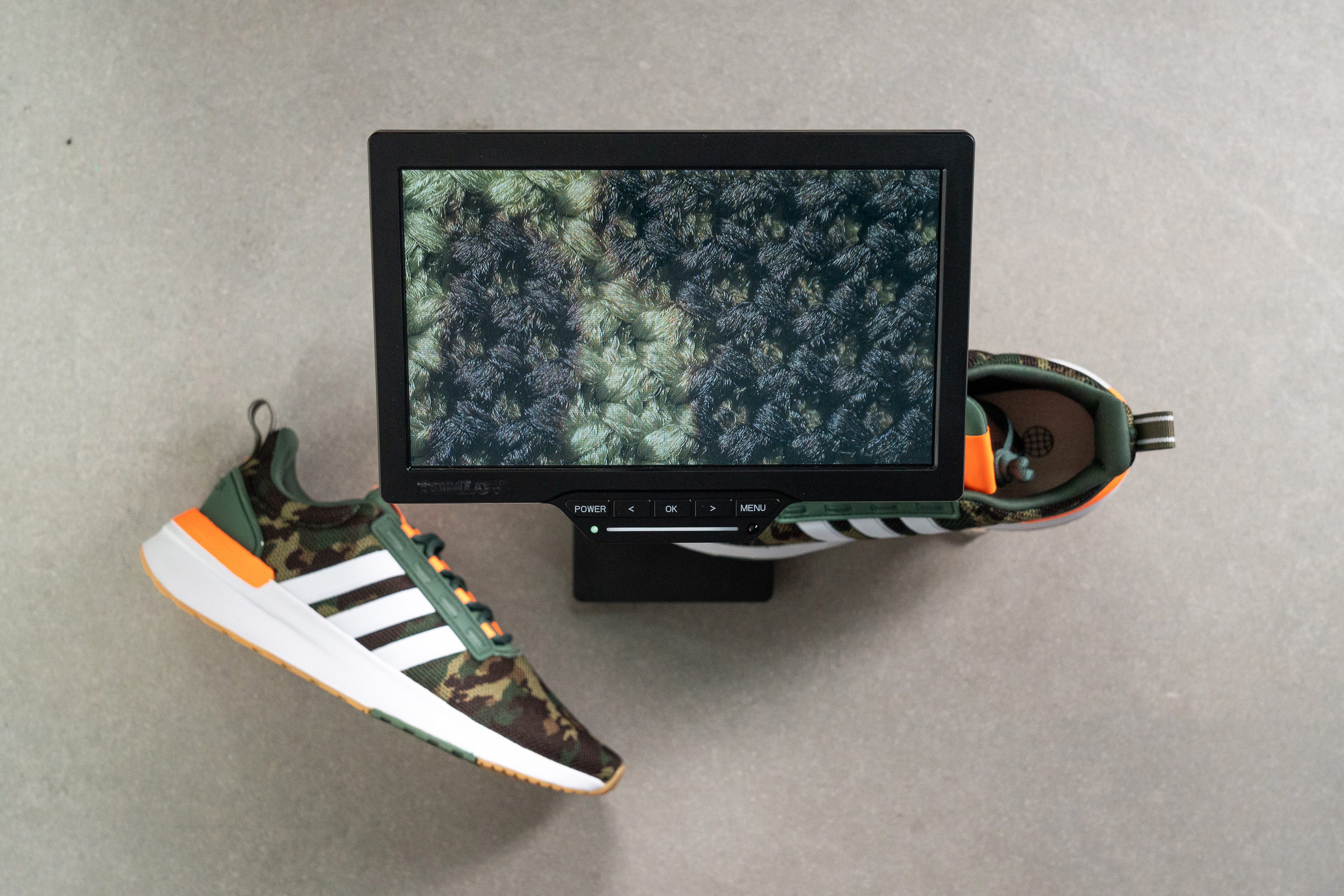
Despite this, we must commend Adidas for their effort, even though this shoe falls below the average in our test results.
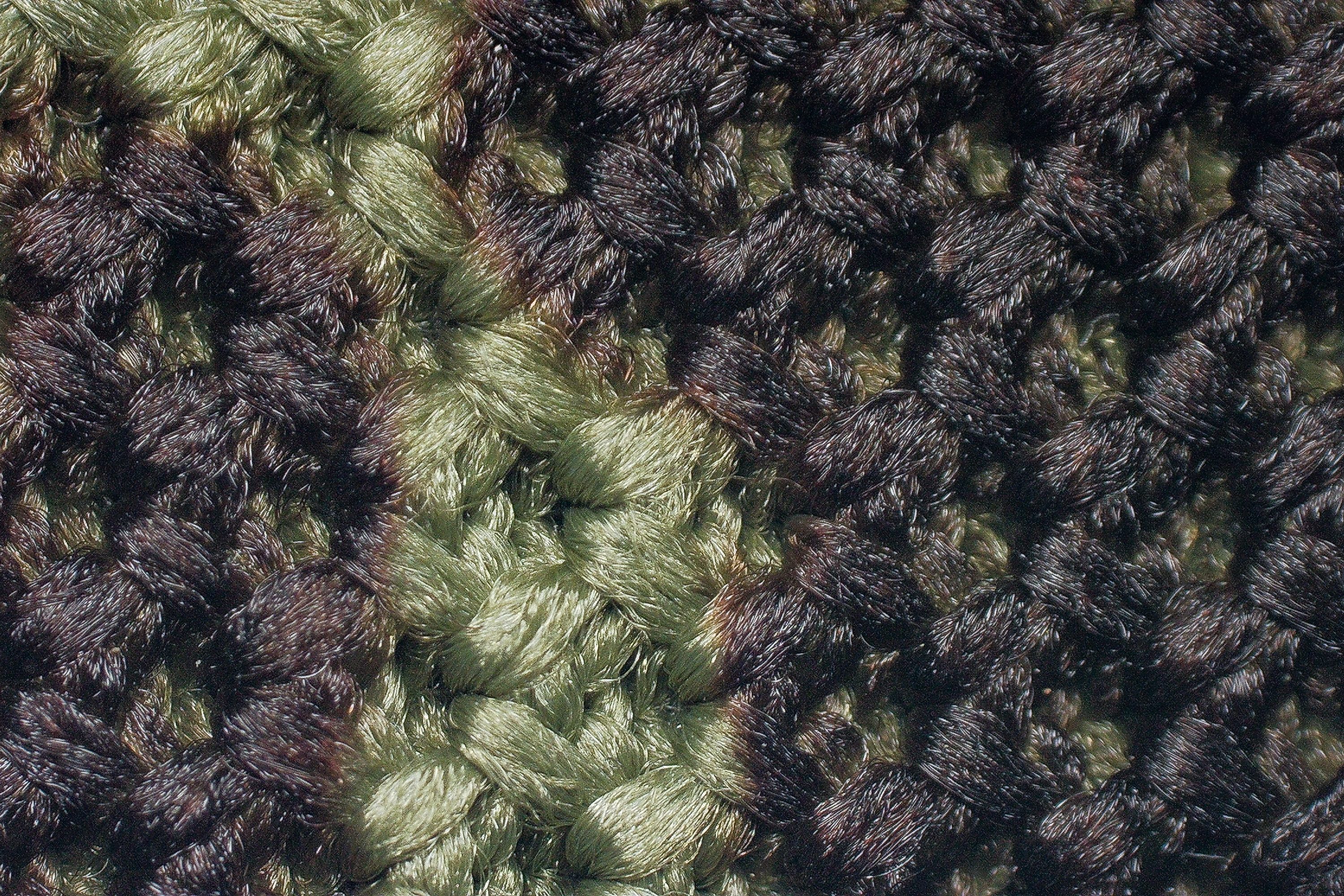
Additionally, we should spotlight the upper's layered construction. This feature impresses as it boosts comfort, albeit at the expense of breathability. Keeping all these considerations in mind, scoring a 3 out of 5 here is indeed a great achievement.
| Racer TR21 | 3 |
| Average | 3.7 |
Stability
Lateral stability test
The moment we slipped our feet into the TR21, we immediately felt its impressive stability. What a pleasant surprise!
Torsional rigidity
The shoe appears and feels flexible, yet when it comes to torsional flexibility, it's fairly average, leaning more towards the firm side and we rated it at 3/5.
| Racer TR21 | 3 |
| Average | 3.5 |
Heel counter stiffness
Adidas didn't took any risks designing the heel counter in the Racer TR21. It's not the usual super-soft heel because there's some resistance, primarily from a plastic piece that surrounds the area.
We rated it as a 2 out of 5, which in our view strikes a good balance between preventing heel slippage and maintaining comfort.
| Racer TR21 | 2 |
| Average | 2.9 |
Midsole width - forefoot
The forefoot offers an average landing platform, measuring 113.9 mm. There's nothing out of the ordinary or negative to report here!
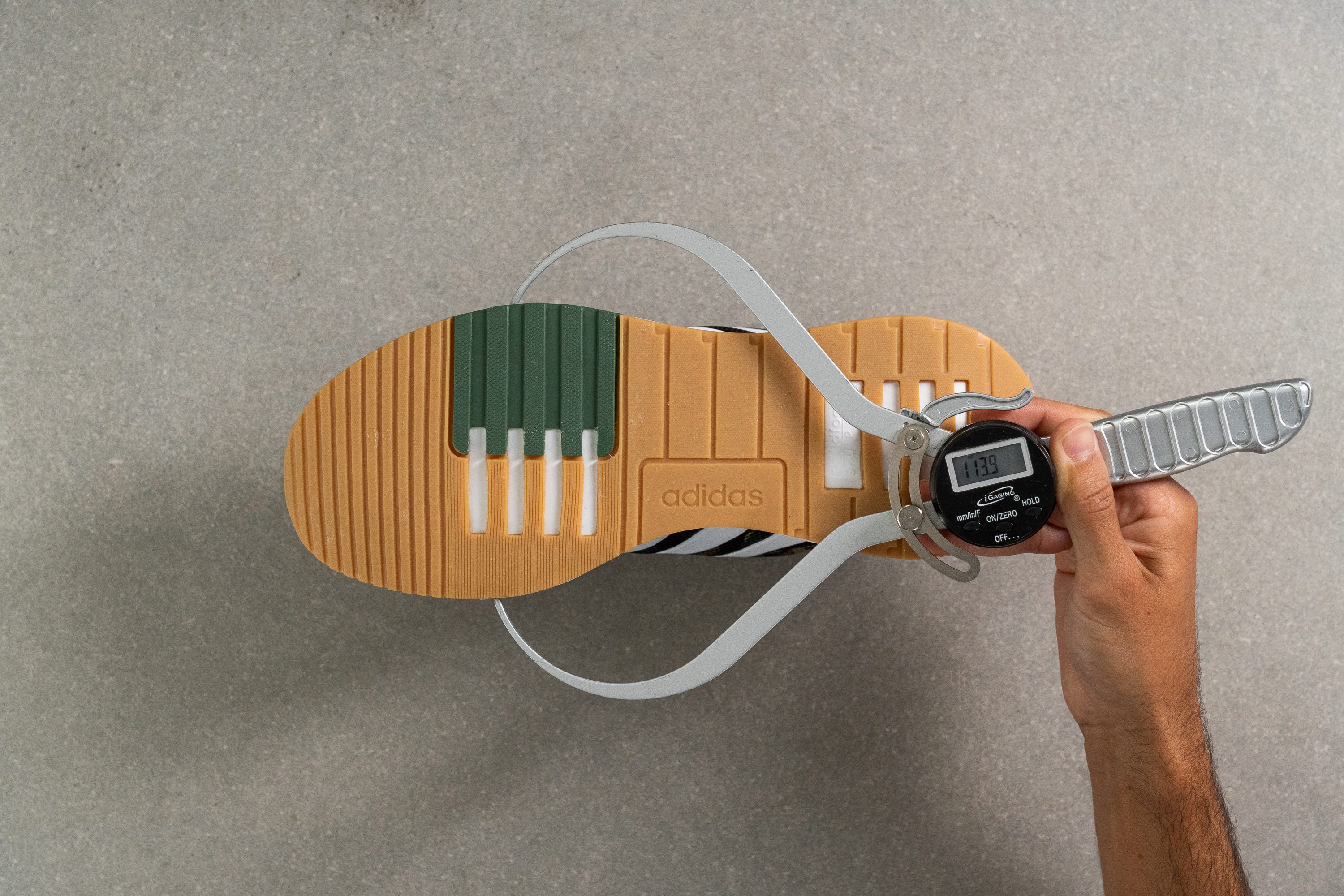
| Racer TR21 | 113.9 mm |
| Average | 114.4 mm |
Midsole width - heel
However, there's something interesting happening with the heel. We initially suspected that this shoe was designed with heel strikers in mind, given the large heel-to-toe drop and its very low forefoot stack.
This became even more evident when we measured the heel at 95.0 mm—wider than most shoes—which promotes stability for heel strikers.
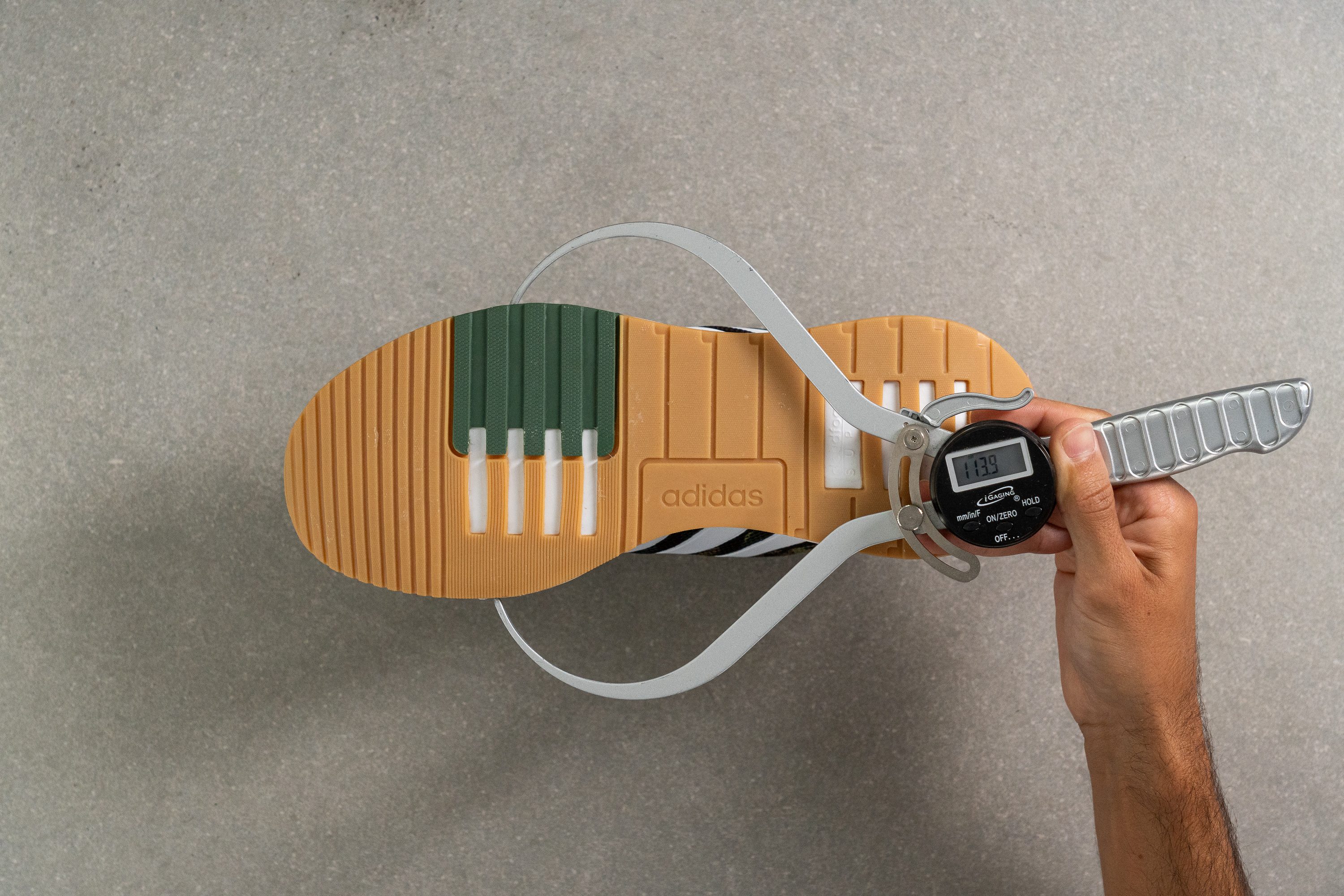
| Racer TR21 | 95.0 mm |
| Average | 90.6 mm |
Durability
Toebox durability
As we noted earlier, the TR21 is equipped with a knit upper. This comes with an advantage; knit typically elevates comfort. However, its downfall is a considerable lack of sturdiness, so we were ready for a disappointing outcome with threads flying everywhere.
Once we engaged the Dremel on the upper, spinning at 10K RPM, our fears were quickly confirmed. The TR21 was on a direct path to securing the lowest of scores: a 1/5.
Still, that's no justification. Other knit shoes, like the On Cloudswift 3, have truly excelled in this same test.
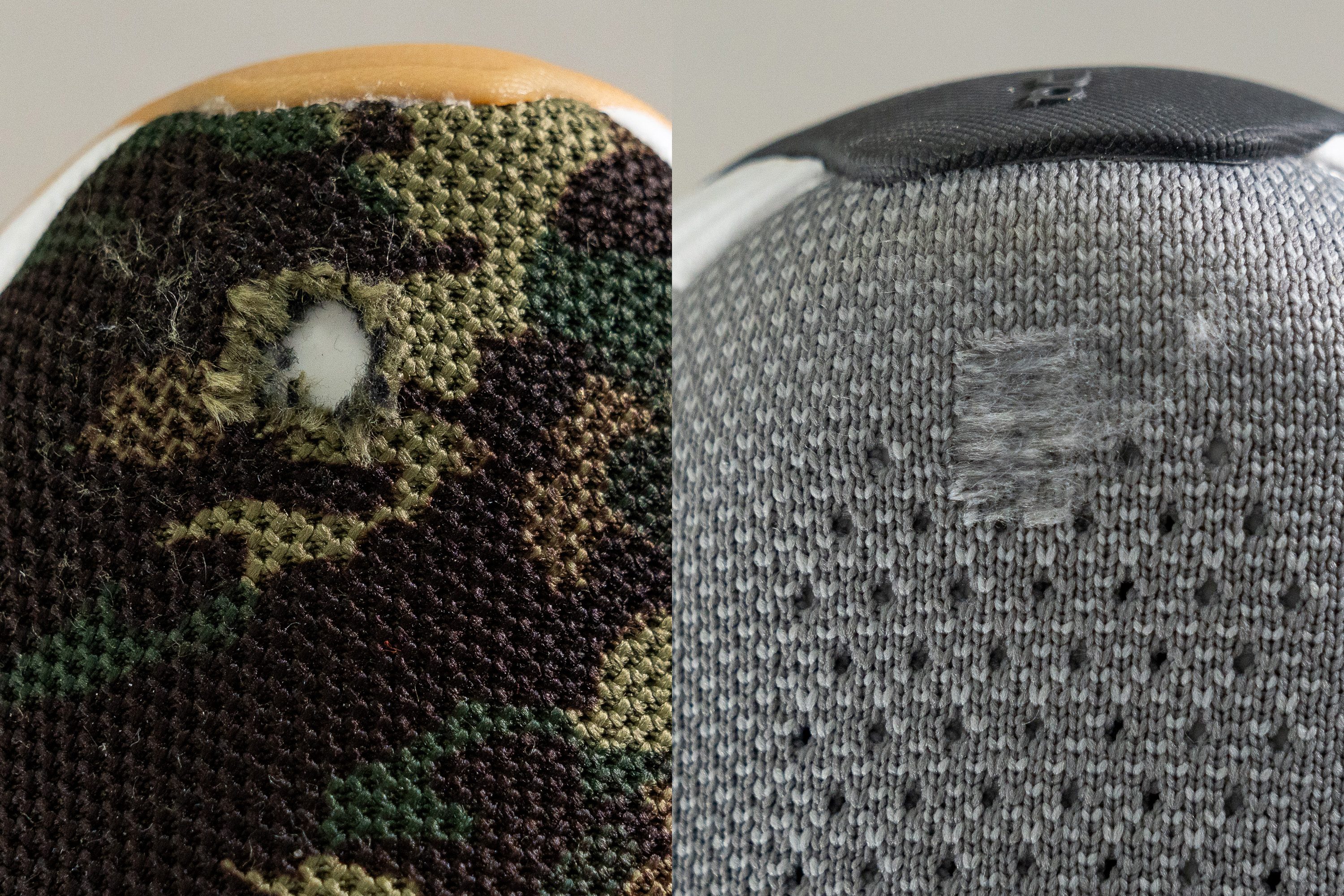
| Racer TR21 | 1 |
| Average | 2.6 |
Heel padding durability
Regrettably, the tale is the same in the heel padding durability test with our Dremel.
The TR21 won a disappointing 1/5 for its lacklustre durability. And it's not a brand thing—another Adidas shoe like the Ultraboost Light did much better.
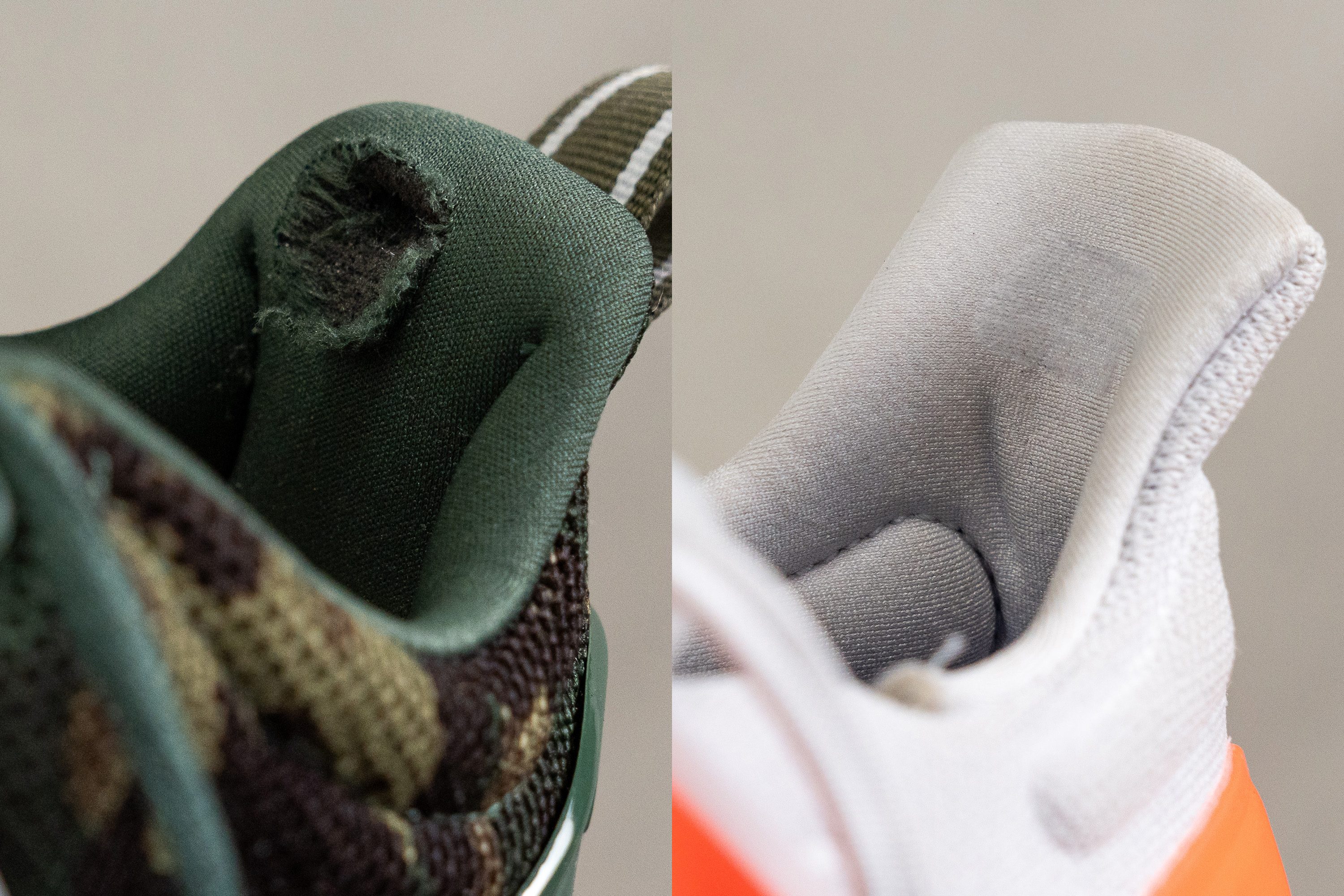
| Racer TR21 | 1 |
| Average | 3.4 |
Outsole hardness
Adidas played it safe with the outsole hardness on this model, with our measurement with the durometer showing it at 80.2 HC.
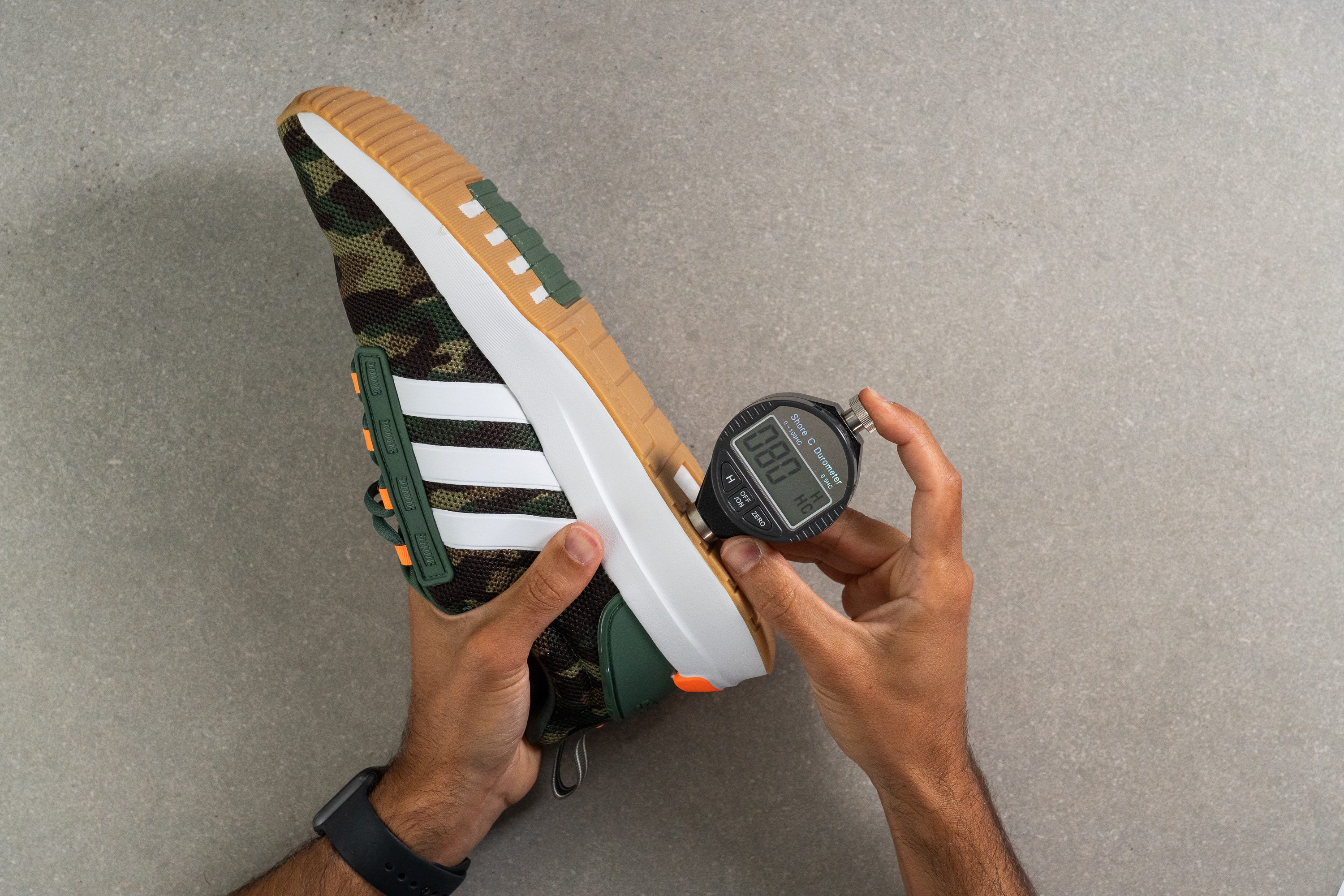
| Racer TR21 | 80.0 HC |
| Average | 79.2 HC |
Outsole durability
For our final test, we used the Dremel once again to evaluate the outsole's durability. Some Adidas shoes typically perform well in this aspect, thanks to their use of Continental rubber, but this shoe lacks that compound. As a result, it offers only average durability.
After removing the Dremel from the shoe, we noted a 1.24 mm indentation in the outsole.
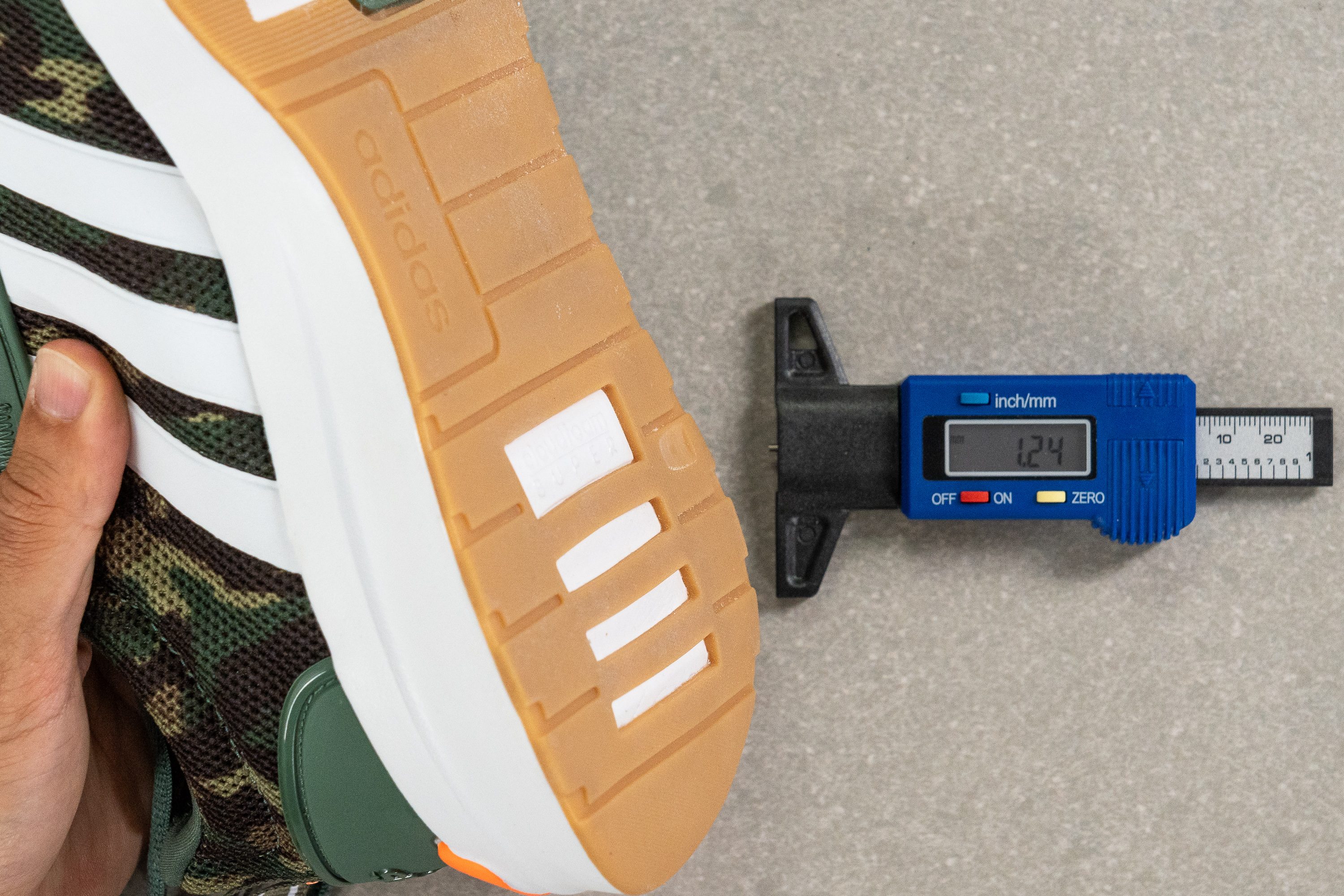
| Racer TR21 | 1.2 mm |
| Average | 1.1 mm |
Outsole thickness
Much like the average hardness, the thickness of the shoe is also pretty standard. After taking precise measurements, we determined that it stands at a mere 3.6 mm.
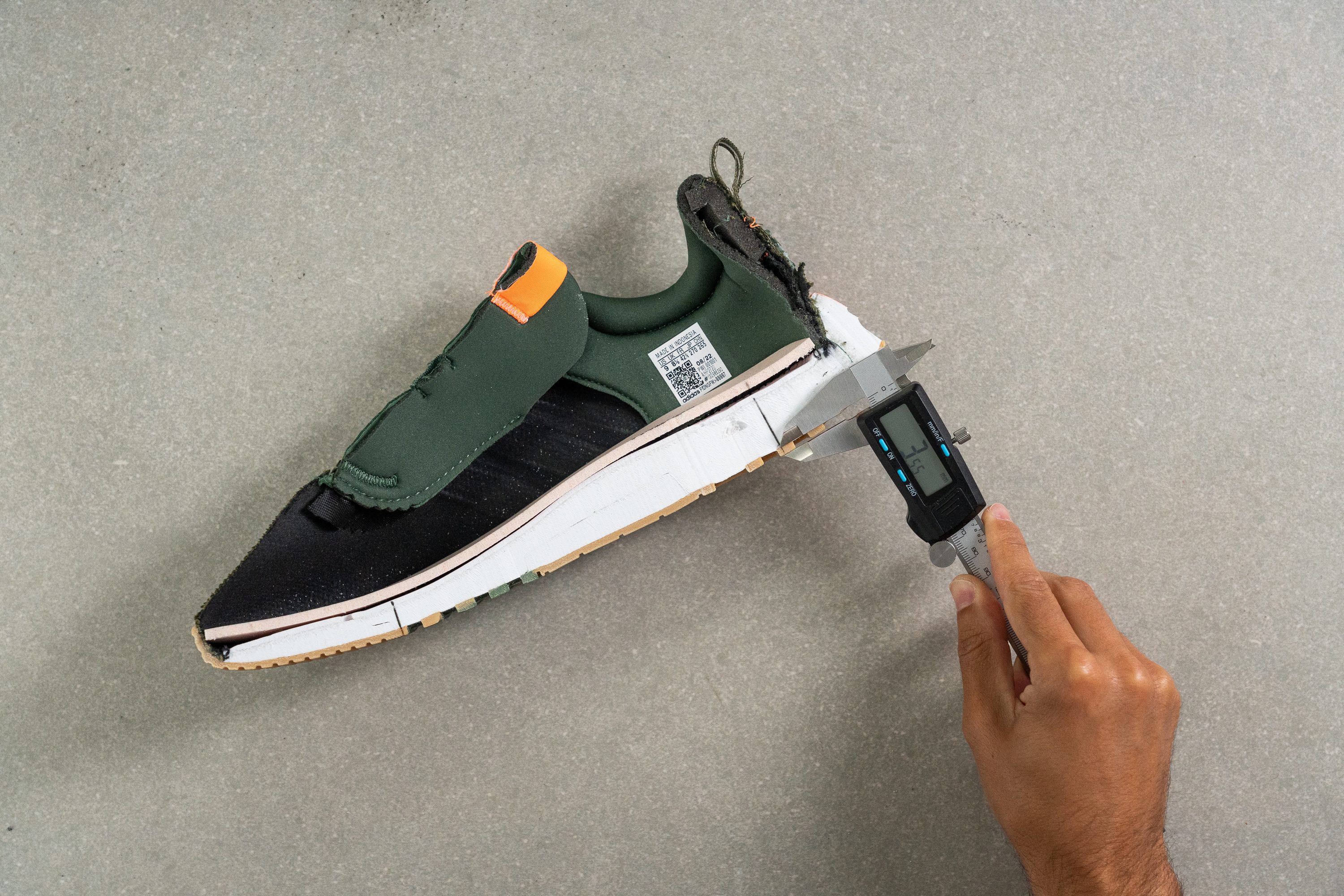
| Racer TR21 | 3.6 mm |
| Average | 3.2 mm |
Misc
Insole thickness
The insole is somewhat thin at 3.4 mm, but it's not something we're overly concerned about. It wasn't a problem in any of our runs.
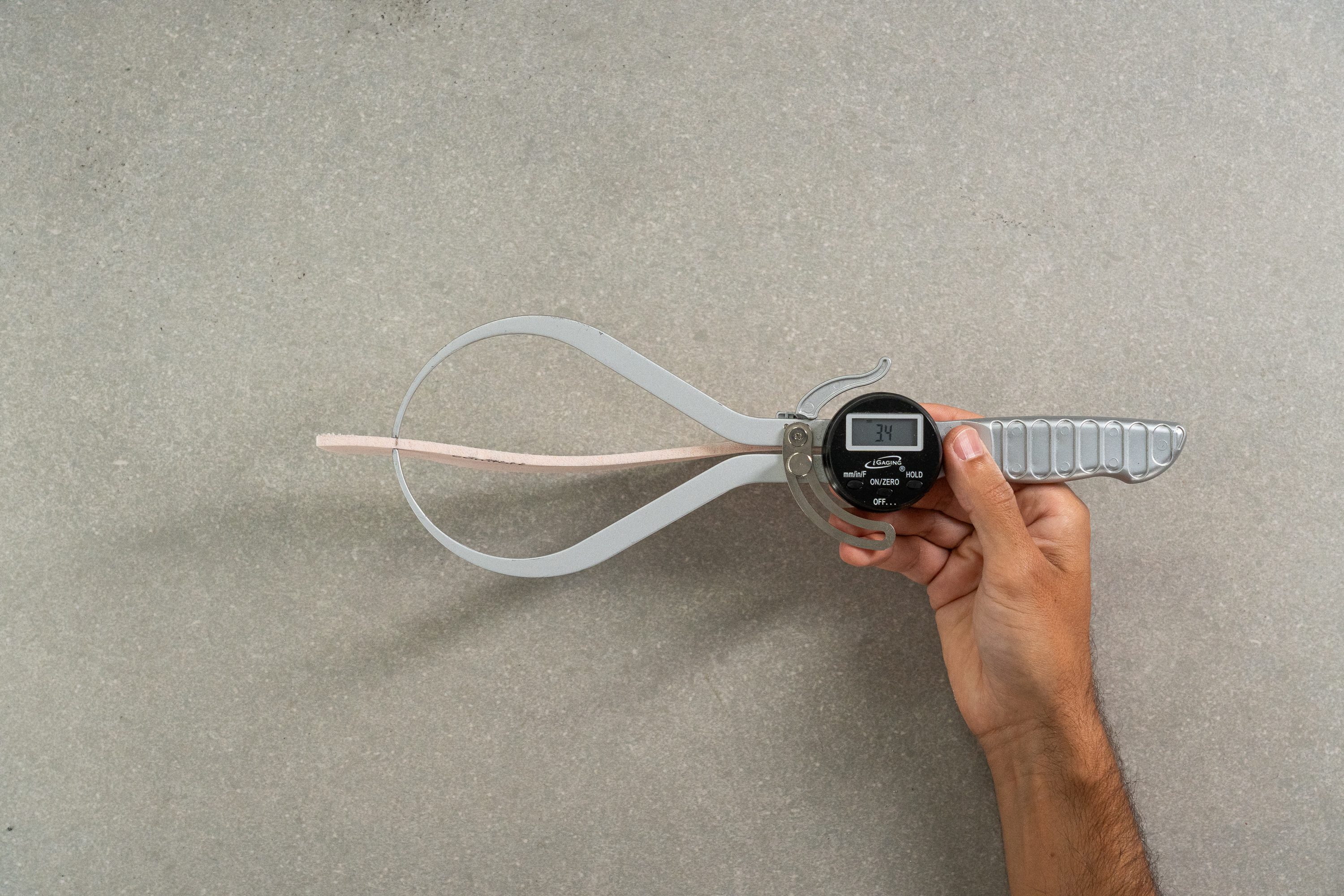
| Racer TR21 | 3.4 mm |
| Average | 4.5 mm |
Removable insole
The insole isn't glued down. This means you have the flexibility to swap it out with custom orthotics or an insole from another shoe.
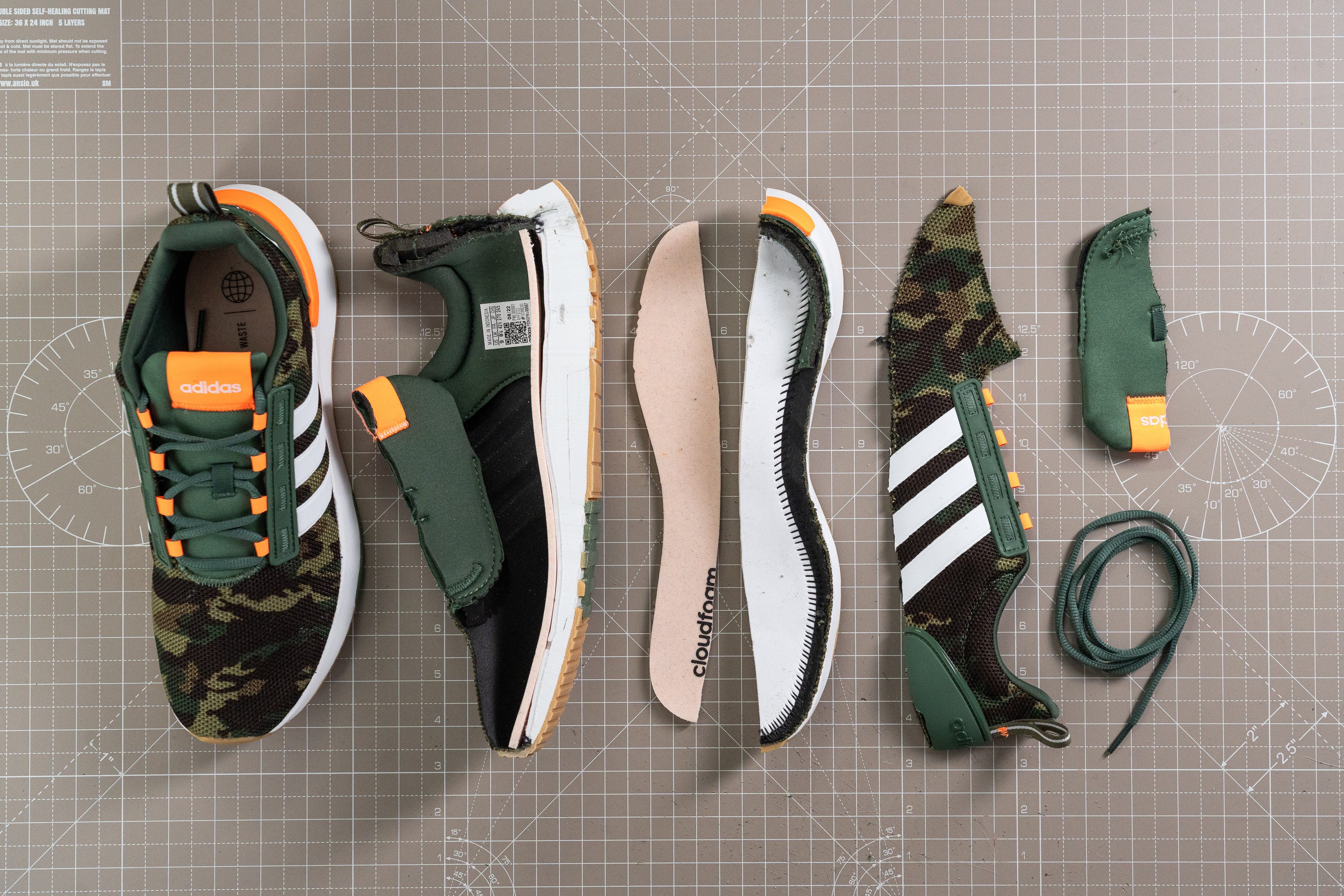
| Racer TR21 | Yes |
Midsole softness in cold (%)
We tested the shoe's performance under cold conditions by putting it in our freezer for 20 minutes.
Now, we can confirm that with a hardness of 28.3 HA, it's close to being considered firm, nearly reaching the 30 HA mark.
Given its £80 price tag, we expected this shoe's performance under cold temperatures to be subpar. This is typically the case with EVA-based midsoles.
So, the 34.5% increase in hardness didn't disappoint us too much. In fact, most shoes in this price range perform significantly worse.
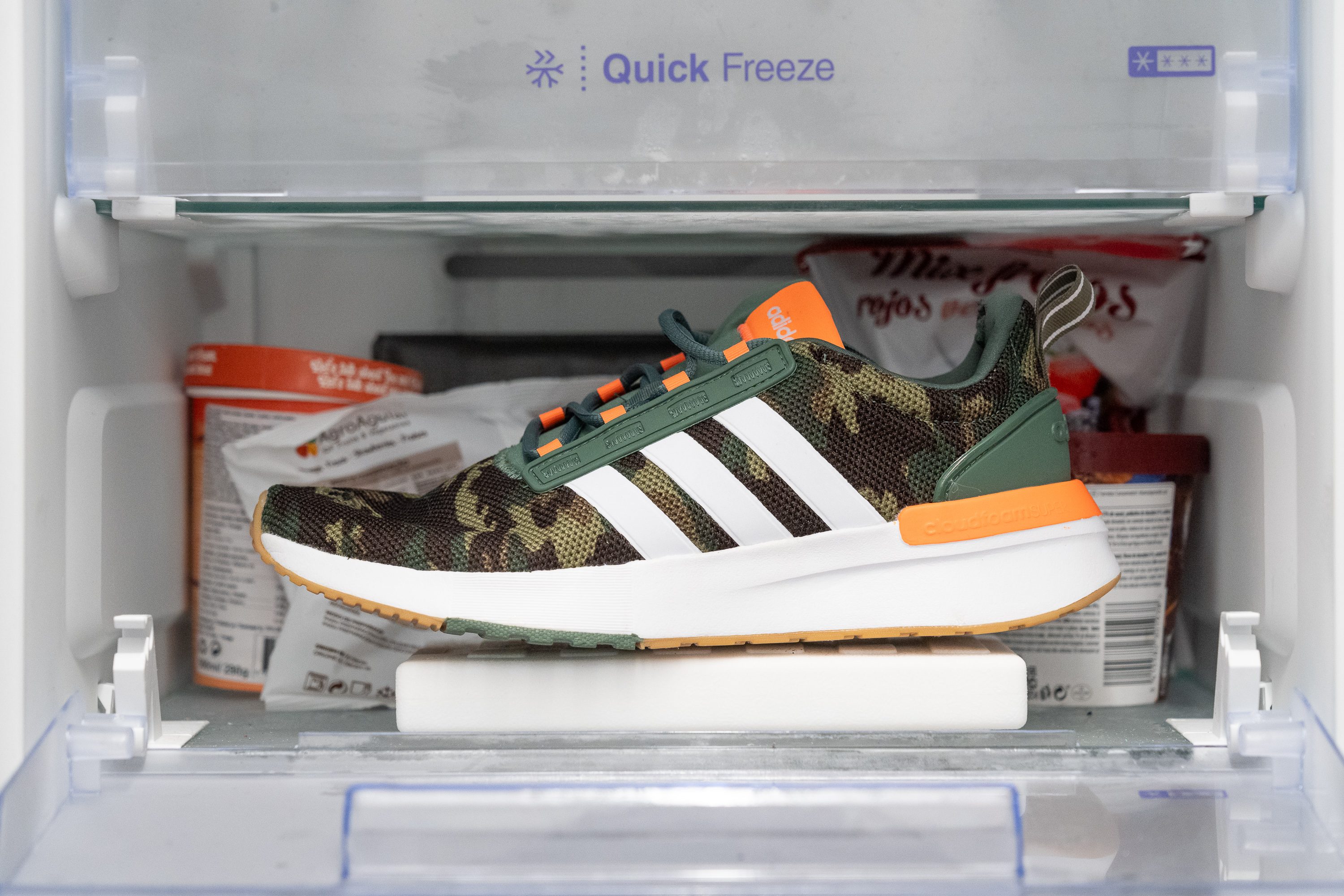
| Racer TR21 | 35% |
| Average | 24% |
Reflective elements
Finally, we're let down to report that the TR21 doesn't feature any reflective elements at all.
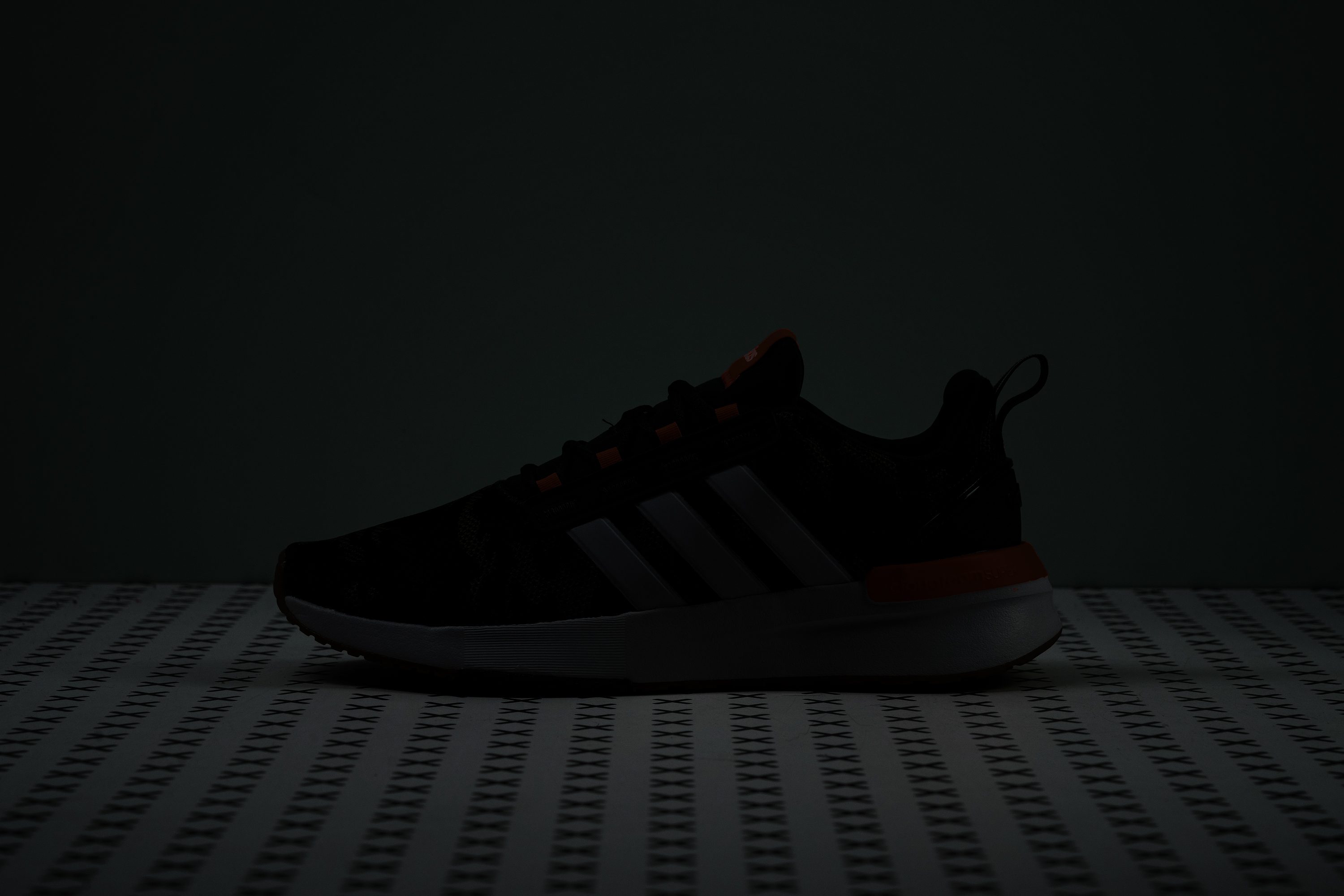
| Racer TR21 | No |
Tongue padding
For a shoe tipping the scales at over 11 ounces, it's seriously disappointing to find just a 2.9-mm-thick tongue. This could lead to compromised comfort, a letdown considering this is a casual shoe intended for all-day wear.
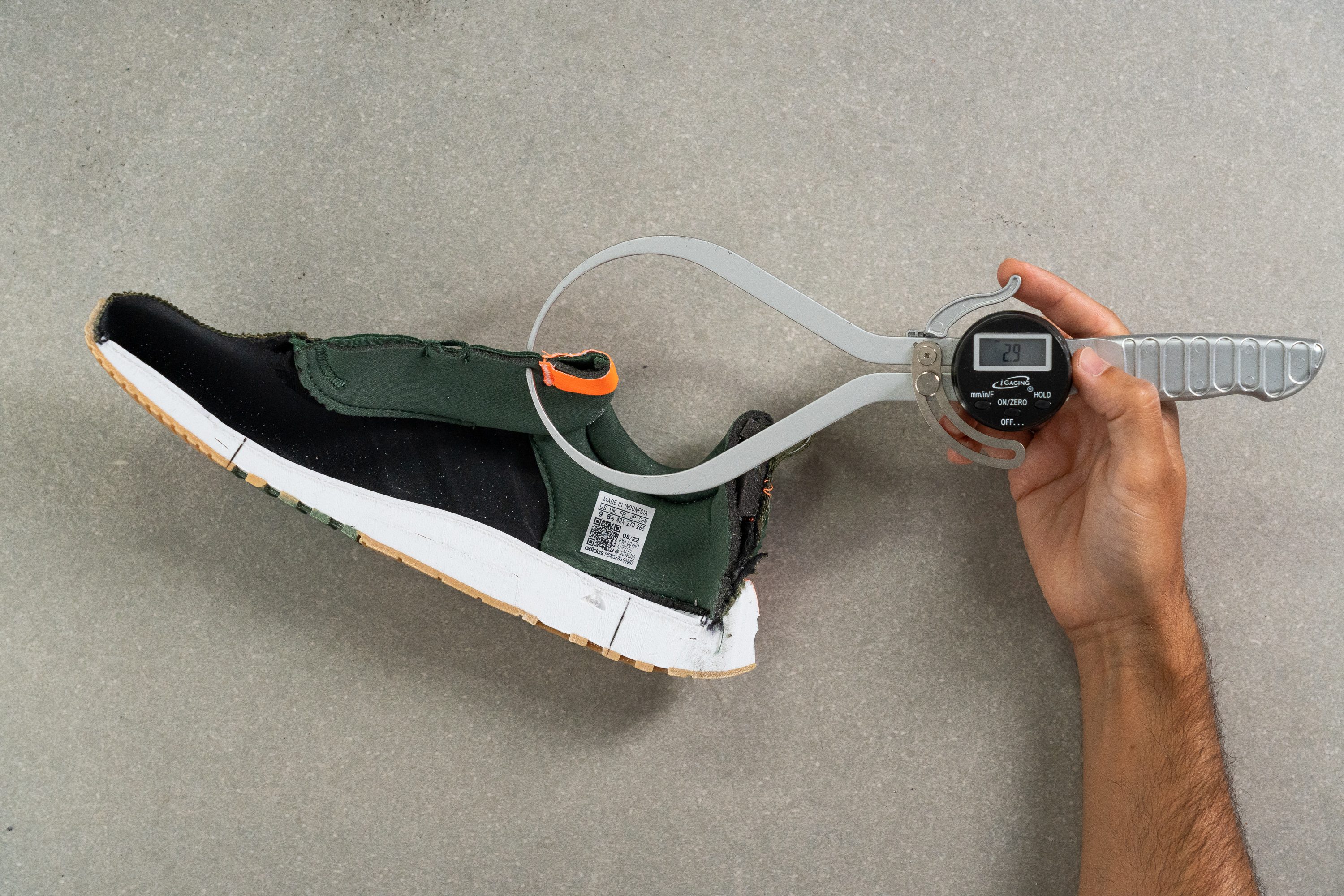
| Racer TR21 | 2.9 mm |
| Average | 5.7 mm |
Tongue: gusset type
While we don't usually anticipate a gusseted tongue in a £80 shoe, it feels like a fantastic bonus when we do encounter one. Unfortunately, we're out of luck this time.
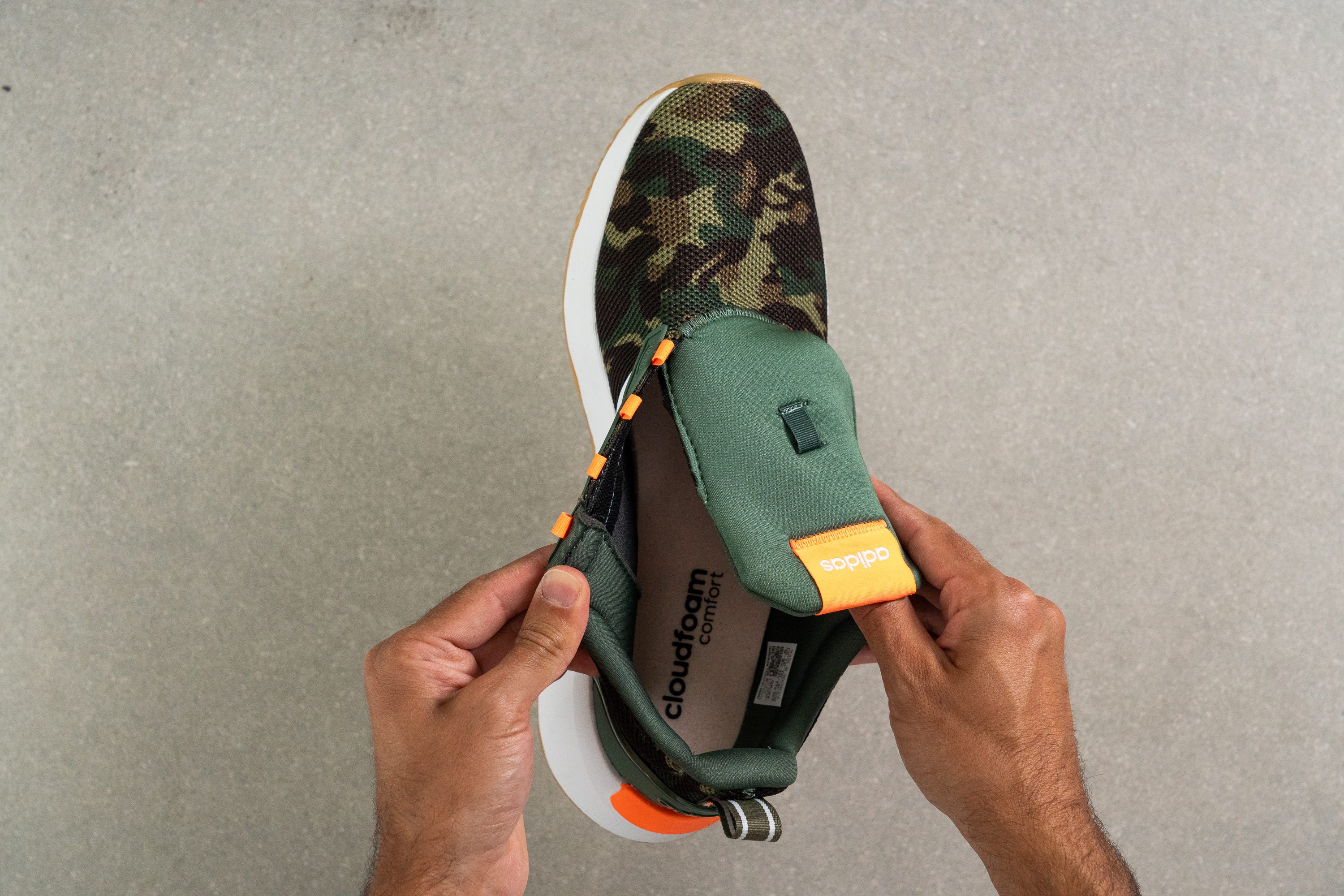
| Racer TR21 | None |
Heel tab
We're always fans of heel tabs, serving as both style-enhancers and practical aids for sliding your feet into the shoe.
This model features a finger-loop heel tab, which earns our praise—it's a cool-looking detail!
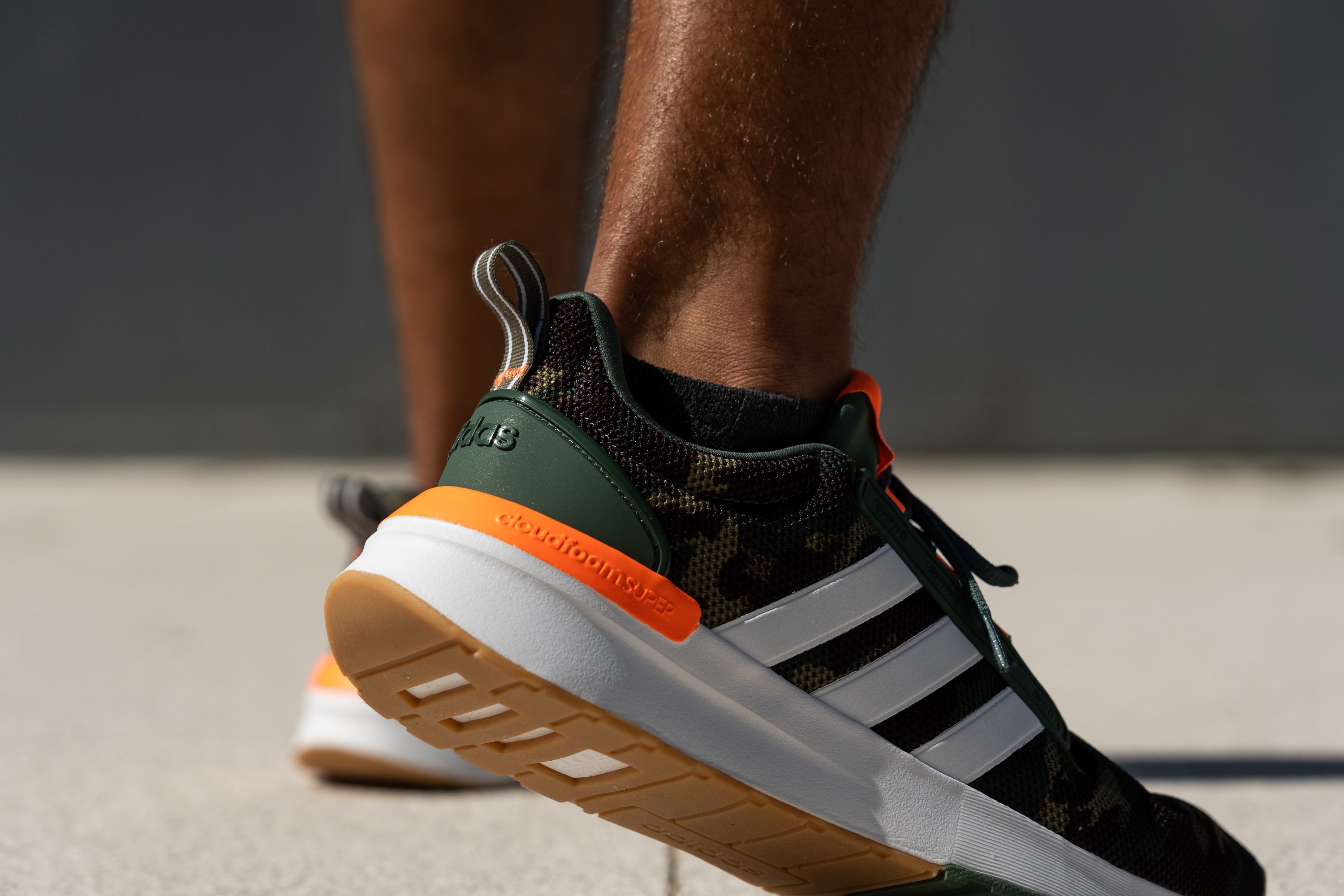
| Racer TR21 | Finger loop |














































